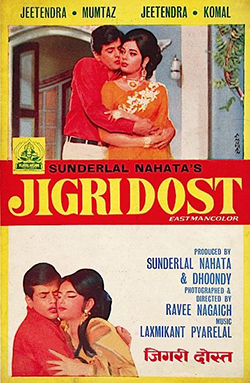
Jigri Dost is a 1969 Hindi-language comedy film, produced by Sunderlal Nahata and Dhoondy under the Vijaya Lakhshmi Pictures banner and directed by Ravikant Nagaich. It stars Jeetendra, Mumtaz and Poonam Sinha and music composed by Laxmikant–Pyarelal. The heroine Komal in the movie is actually Poonam Sinha, Shatrughan Sinha's wife. The film is a remake of 1966 Kannada movie Emme Thammanna, which had earlier been remade in Telugu in 1968 as Govula Gopanna and which later went on to be remade in Tamil in 1970 as Maattukara Velan.
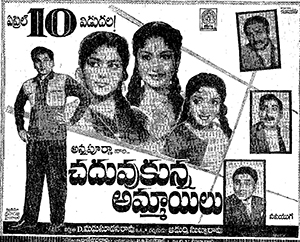
Chaduvukunna Ammayilu is a 1963 Indian Telugu-language drama film directed by Adurthi Subba Rao. It stars Akkineni Nageswara Rao, Savitri, Krishna Kumari with music composed by S. Rajeswara Rao. It was produced by D. Madhusudhana Rao under the Annapurna Pictures banner. The film is based on the Telugu novel Kaalaatheetha Vyakthulu, written by Dr. Sridevi. The film was recorded as a Super Hit at the box office.
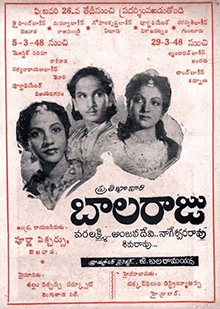
Balaraju is a 1948 Indian Telugu-language swashbuckler fantasy film produced and directed by Ghantasala Balaramayya under the Pratibha Productions banner. It stars Akkineni Nageswara Rao, S. Varalakshmi, and Anjali Devi with music jointly composed by Ghantasala, Galipenchala Narasimha Rao and C. R. Subbaraman. The film was recorded as an Industry Hit at the box office and was the first Telugu Silver Jubilee film.

Dharma Daata is a 1970 Indian Telugu-language drama film, produced by Tammareddy Krishna Murthy under the Ravindra Art Pictures banner and directed by A. Sanjeevi. It stars Akkineni Nageswara Rao and Kanchana, with music composed by T. Chalapathi Rao. It is a remake of the Tamil film Enga Oor Raja (1968), and was a box office success.

Dharma Patni or Dharmapatni is a 1941 Indian Telugu-language drama film produced and directed by P. Pullayya under the Famous Films banner. It stars Santha Kumari, Bhanumathi, Uppuluri Hanumantha Rao and C. Hemalatha. The film marks the debut of Akkineni Nageswara Rao, who played a minor role as one of the ten school children in a song sequence, and also that of the writer Chakrapani.
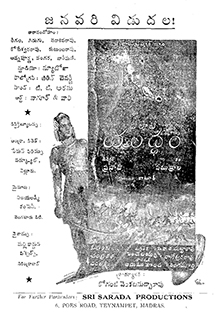
Palnati Yuddham is a 1947 Indian Telugu-language historical war film jointly directed by L. V. Prasad and Gudavalli Ramabrahmam. Based on the Battle of Palnadu, the film stars Akkineni Nageswara Rao, Govindarajula Subba Rao and Kannamba, with music composed by Galipenchala Narasimha Rao. It is produced by Koganti Venkata Subba Rao under the Sri Sarada Productions banner.

Pellinaati Pramanalu is a 1958 Indian Telugu-language comedy drama film, produced and directed by K. V. Reddy. It stars Akkineni Nageswara Rao and Jamuna, with music composed by Ghantasala. The film was simultaneously made in Tamil as Vaazhkai Oppandham with a slightly different cast that released the following year.

Bangaru Gaajulu is a 1968 Indian Telugu-language drama film directed by C. S. Rao from a story written by Rajasri. Produced by Tammareddy Krishna Murthy, it stars Akkineni Nageswara Rao, Bharathi, and Vijaya Nirmala with the music composed by T. Chalapathi Rao. Released on 22 August 1968, the film won Nandi Awards from the Government of Andhra Pradesh, including Third Best Feature Film and Best Story Writer (Rajasri).
Ghantasala Balaramayya was an Indian film director, producer, and actor in Telugu cinema. His notable films include Sri Seetarama Jananam (1944), Balaraju (1948), Swapna Sundari (1950), and Sri Lakshmamma Katha (1950). Balaramayya is known for providing Akkineni Nageswara Rao his first lead role in the 1944 mythological film Sri Seetarama Jananam.

Manushulu Mamathalu is a 1965 Indian Telugu-language drama film produced by A. V. Subba Rao under the Prasad Art Productions banner and directed by K. Pratyagatma. It stars Akkineni Nageswara Rao, Savitri and Jayalalithaa, with music composed by T. Chalapathi Rao. T. Rama Rao worked as associate director for this film. This picture is also remembered to be Jayalalithaa's Telugu debut as a leading actress. This was the first Telugu film to ever receive an A certificate from the Censor Board.
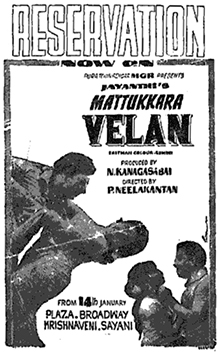
Mattukkara Velan is a 1970 Indian Tamil-language action drama film directed by Pa. Neelakandhan. It is a remake of the 1966 Kannada film Emme Thammanna. The film stars M. G. Ramachandran, Jayalalithaa and Lakshmi, with S. A. Ashokan as the villain. It was released on 14 January 1970 and ran for 100 days.

Santhi Nivasam is a 1960 Indian Telugu-language drama film directed by C. S. Rao. The film stars Akkineni Nageswara Rao, Rajasulochana, Kantha Rao, Krishna Kumari and Devika. It is an adaptation of Palagummi Padmaraju's Telugu play of the same name, which itself was based on B. S. Ramiah's Tamil play Malliyam Mangalam.

Bangaaru Kalalu is a 1974 Telugu-language drama film, produced by D. Madhusudhana Rao under Annapurna Pictures banner and directed by Adurthi Subba Rao. It stars Akkineni Nageswara Rao, Waheeda Rehman, Lakshmi and music composed by S. Rajeswara Rao. The film was based on Yaddanapudi Sulochana Rani's novel of the same name.

manikyam Anna rc pur is a 1969 Indian Telugu-language drama film directed by Bapu. It stars Akkineni Nageswara Rao, Vijaya Nirmala, Sobhan Babu and Krishnam Raju, with music composed by K. V. Mahadevan. The film was remade in Tamil as Manidhanum Dheivamagalam (1975) and in Hindi by the same director as Paramaatma (1994).
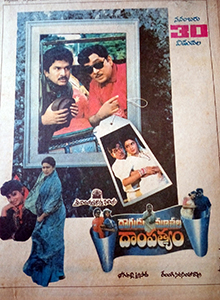
Dagudumuthala Dampathyam is a 1990 Indian Telugu-language comedy film, produced by Bogavalli Prasad and directed by Relangi Narasimha Rao. Starring Akkineni Nageswara Rao, Rajendra Prasad, Sharada, Vani Viswanath, Ramya Krishna, and music composed by M. M. Keeravani. The film recorded as Super Hit at the box office.

Punarjanma is a 1963 Indian Telugu-language drama film, produced by A. V. Subba Rao and directed by K. Pratyagatma. Based on the novel Patthar Ke Honth by Gulshan Nanda, it stars Akkineni Nageswara Rao and Krishna Kumari, with music composed by T. Chalapathi Rao. The film was remade in Hindi as Khilona (1970), in Tamil as Engirundho Vandhaal and in Malayalam as Amrithavaahini.

Sipayi Chinnayya is a 1969 Telugu-language drama film produced by D. Ramanaidu under the Suresh Productions banner and directed by G. V. R. Seshagiri Rao. It stars Akkineni Nageswara Rao, K. R. Vijaya, Bharathi with music composed by M. S. Viswanathan.
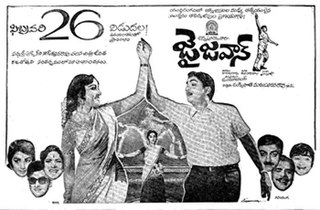
Jay Jawan is a 1970 Telugu-language drama film produced by D. Madhusudhana Rao under the Annapurna Pictures banner and directed by D. Yoganand. It stars Akkineni Nageswara Rao, Bharati, Krishnam Raju and music composed by S. Rajeswara Rao.

Aatmiyudu (transl. Soulmate) is a 1977 Telugu-language drama film, produced by Vadde Sobhanadri under the Vijaya Madhavi Pictures banner and directed by T. Rama Rao. It stars Akkineni Nageswara Rao, Jayachitra and music composed by J. V. Raghavulu.

Vaazhkai Oppandham is a 1959 Indian Tamil-language comedy drama film, produced and directed by K. V. Reddy. It stars Akkineni Nageswara Rao and Jamuna, with music composed by Ghantasala. The film was simultaneously made in Telugu as Pellinaati Pramanalu (1958) with a slightly different cast, but was released on 4 September 1959.



















